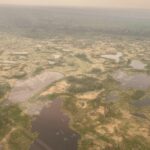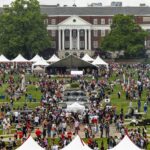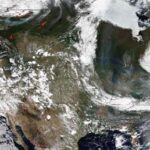With Maryland Day approaching, organizers at the Earth System Science Interdisciplinary Center (ESSIC) are readying an arsenal of family-friendly activities to introduce the public to ESSIC and answer any scientific questions they might have.
Saturday, April 30, marks the 15th time that ESSIC will be represented at the annual Maryland Day celebration. Maureen Cribb, an ESSIC faculty specialist, led the charge in 2001 when ESSIC first participated in the event. A lot has changed since that first year, as the entire event has become more popular and attracted more people.
“It’s gone from small-time to a bit more big-time,” Cribb explains. “In 2001 we were still on campus in the Computer and Space Science building. So we built a kind of mini base-camp in the atrium of the CSS building. It was just small potatoes. Now, we have a dedicated Earth System Science tent, a bigger space, and a much better central location.”
Cribb has helped organize ESSIC’s involvement every year, more recently with the help of ESSIC Assistant Director Andrew Negri. Together, they plan to bring in a variety of different scientists and advocates, including the Maryland and Delaware Climate Change Education Assessment and Research Group (MADECLEAR), NOAA’s lighting and flash-flood group, and two hurricane aviators from the NOAA Corps.
Along with guest speakers, there will also be a number of interactive activities geared toward a younger audience. Visitors will be able to gaze at the “Magic Planet,” a small model that projects different geophysical datasets onto a globe. Viewers can examine a global portrait of the world’s ice extent, aerosol concentrations, or sea surface temperatures and gain a visual understanding of some of ESSIC’s groundbreaking climate research. Children will also be able to meet Owlie, the NOAA mascot, and participate in a sponge-squeezing game where they simulate the amount of water that can be drawn from a cloud.
Despite the new gadgets and games, Cribb maintains that the event is really just an opportunity to discuss the science.
“It’s interesting because you’re interacting with kids, senior citizens, scientists, non-scientists, and teachers,” says Cribb. “We’re just there to field questions and explain things like climate change. We’re just talking to the general public- and they always have questions.”






